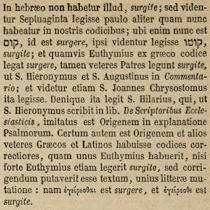Verse 3
It is vain for you to rise before light, rise ye after you have sitten, you that eat the bread of sorrow.
Vanum est vobis ante lucem surgere : surgite postquam sederitis, qui manducatis panem doloris.

The children of Israel, while they were experiencing their concerns, began the work of building before daylight on account of their great anxiety; the Holy Spirit warned them that it would profit them nothing if they began to work before daylight, unless the Lord were present with them; but if they accepted the Lord’s help and placed their hope in Him, their work would proceed prosperously, even if they girded themselves for work after necessary sleep, and after the sun had risen. “It is vain,” he says, “for you to rise before light” in order to proceed with the building work; here is to be understood: Unless the Lord build the house, or “keep the city;” and therefore trusting in the Lord and calling upon Him continually, “rise ye after you have sitten,” that is, after a necessary night’s sleep, rise to the task, “you that eat the bread of sorrow,” that is, you who now live in anguish and under the oppression of continuous harassment from enemies. But in the sense intended more by the Holy Spirit, the heads of the Church are instructed, as also are all the faithful, whether as communities or individuals, not to place their trust in the works more than in prayer; but they should imitate the Lord who during the night keep watch in prayer, as is written in Luke vi: “He passed the whole night in the prayer of God”
[1] and in the daytime he preached and confirmed His speech with miracles; as also the Apostles are to be imitated who say in Acts vi: “We will give ourselves continually to prayer, and to the ministry of the word.”
[2] “It is vain,” he says, “for you to rise before light,” that is, to use all your time in
building and guarding (your work). “Rise ye after you have sitten,” that is, rise to your task after you have slept, leaving your rest of prayer and contemplation. “You that eat the bread of sorrow,” that is, you who on account of your longing for your heavenly home continually groan and say: “My tears have been my bread day and night, whilst it is said to me daily: Where is thy God?”
[3] Those who love ardently, when they cannot enjoy the presence of the object of their love, are sustained in the meantime by longing and groaning, and in this way tears become bread for them day and night, that is, in daytime meals and in supper by night. In Hebrew, it does not have
surgite / rise ye; but the Septuagint translators seem to have read this slightly differently than what we have in our codices; where the Hebrew word is found which means
to rise, the translators seem to have read a word translated as
surgite / rise ye; and although Euthymius reads the Greek codex as
to rise, the ancient Fathers read
surgite / rise ye, as do St. Jerome and St. Augustine in his Commentary. Finally, St. Hilary reads it in this way too and he, as St. Jerome writes in his book
De Scriptoribus Ecclestiacis, copied Origen in his explanation of the Psalms. It is certain that Origen and other ancient Greek and Latin writers had codices that were more correct than the one Euthymius had, unless Euthymius also read it as
surgite / rise ye but thought he should correct the text, by changing one letter : for ἐγεἱρεσθαι is
to rise, and ἐγεἱρεσθε is
rise ye.
[1] And it came to pass in those days, that he went out into a mountain to pray, and he passed the whole night in the prayer of God. Factum est autem in illis diebus, exiit in montem orare, et erat pernoctans in oratione Dei. [Luke vi 12]
[2] But we will give ourselves continually to prayer, and to the ministry of the word. Nos vero orationi, et ministerio verbi instantes erimus. [Acts vi 4]
[3] My tears have been my bread day and night, whilst it is said to me daily: Where is thy God? Fuerunt mihi lacrimae meae panes die ac nocte, dum dicitur mihi quotidie : Ubi est Deus tuus? [Psalm xlii 4]
Totus tuus ego sum
Et omnia mea tua sunt;
Tecum semper tutus sum:
Ad Jesum per Mariam.


No comments:
Post a Comment